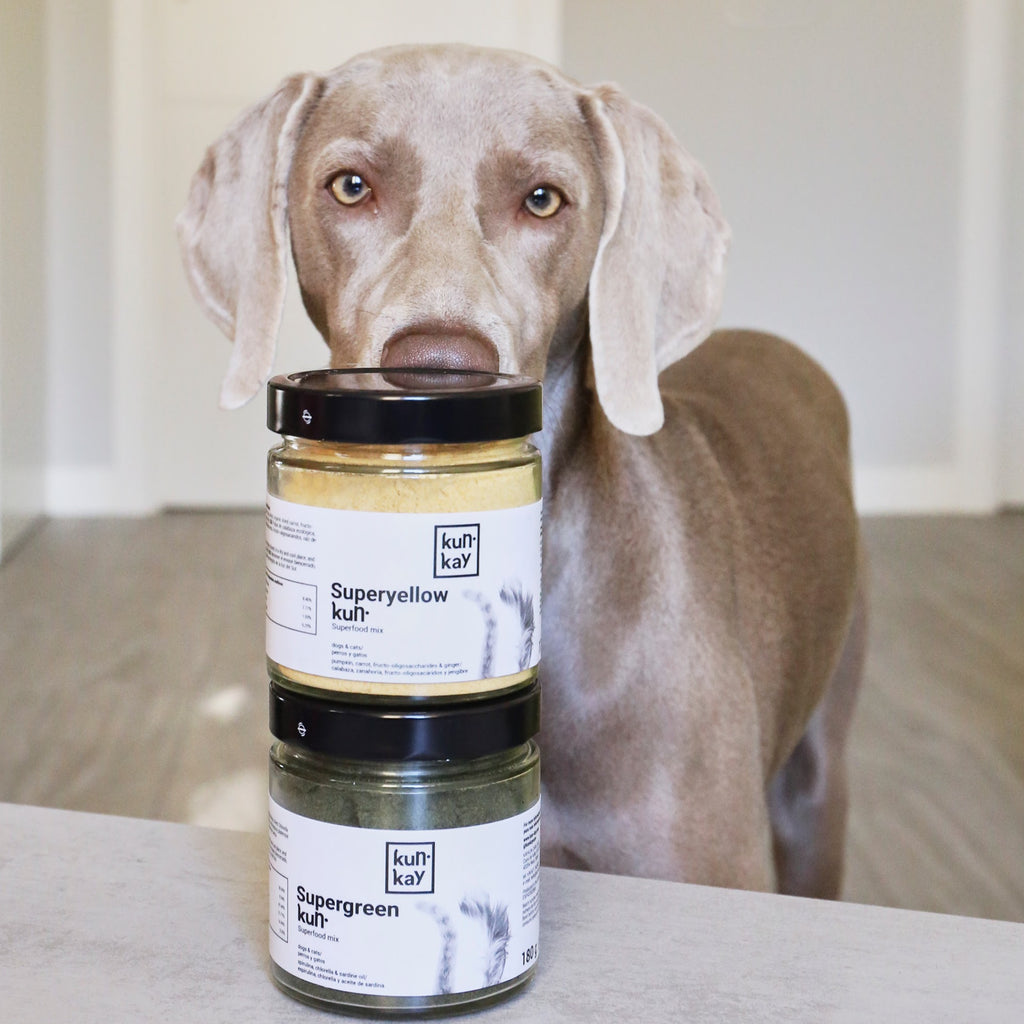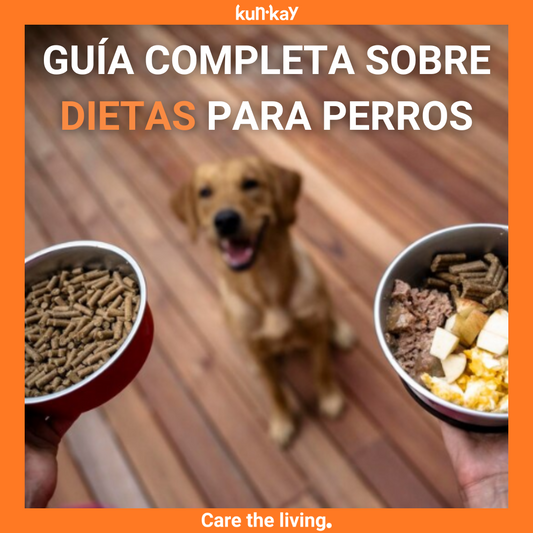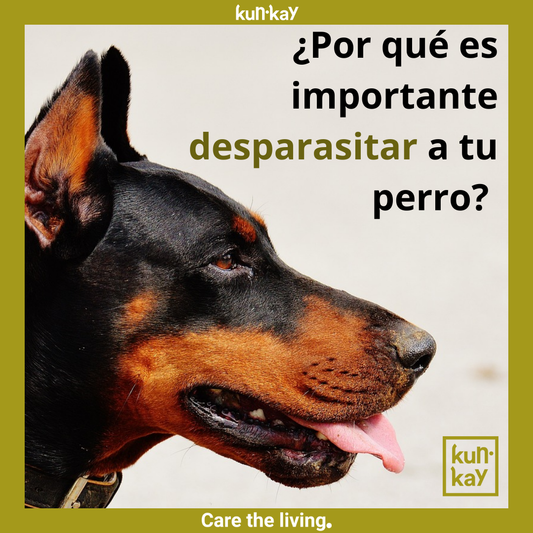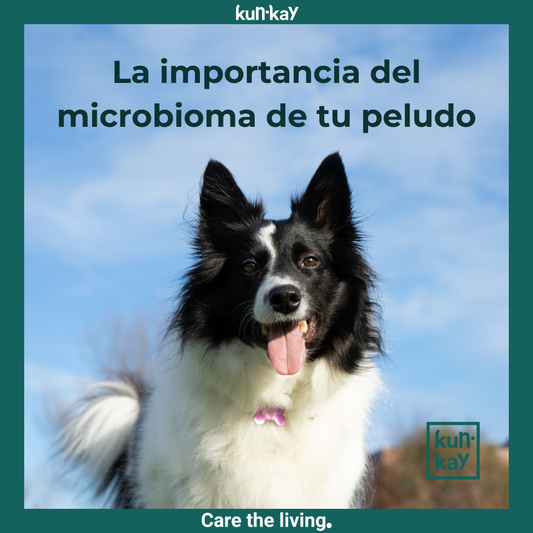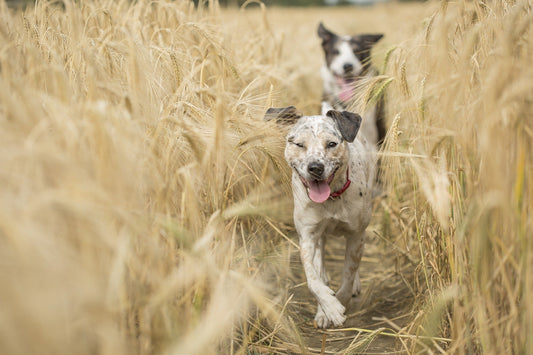Guide to foods cats can (and can't) eat

If you share your life with a kitty, you will surely be interested to know which foods cats can eat and, more importantly, which ones they can't!
Anyone who has a cat knows that they can be very affectionate and persuasive, especially if there is something that catches their attention. Many times while cooking or when we are eating we find ourselves with eyes like saucers and a pleading "meow" that asks us to try a little bit. Has it happened to you? Surely yes, and of course you have asked yourself: Can I give this food to my cat?
As you may already know, not all food suitable for humans is suitable for our four-legged partners, but that does not mean that they should be fed exclusively on the basis of a sad feed. Therefore, from Kunkay, in addition to offering you the best natural supplements to take care of your pet's health, we have also prepared a guide with the foods that cats can and cannot eat.
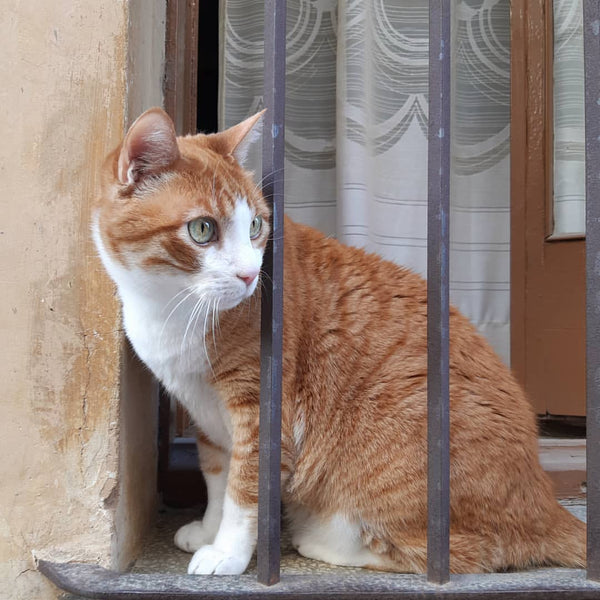
By the way, if you are interested in knowing what your kitten needs to grow big, healthy and strong, don't miss our article on vitamins for cats in which we tell you what problems can be caused by deficiencies of different vitamins and the most recommended supplementation for each occasion.
Let's go with our guide to foods that cats can eat!
1. Fish and shellfish that cats can eat
Fish is a delicacy for kittens and, as long as it is cooked, it is very beneficial for their health. The best for them is white fish but they can also eat tuna or trout, their taste drives them crazy!
A recommendation? Avoid canned products, they usually have too much salt and abusing them can be detrimental to their health.
Seafood, on the other hand, is not recommended; because of its high protein content, it can be indigestible for cats. In addition, its consumption can increase the risk of the feline contracting intestinal parasites.
2. Dairy and dairy products for cats
Although you may have seen cats happily drinking a bowl of milk many times in cartoons, movies and television, felines are lactose intolerant.
Even if it is a puppy, you should not give your cat milk. Cow's milk has a higher concentration of sugar and fat than cat's milk and can cause diarrhea in cats.
The same goes for cheese, it has a large amount of fat that can cause digestive upset to your cat. Although it is true that they love its flavor, that's why you will have seen a lot of products and cat treats that imitate its taste. Be careful with leaving cheese in sight if you have a kitten at home!
The only exception is yogurt, as long as it is plain and without sugar or sweeteners. Of course, it should be given in small amounts.
3. Can cats eat eggs or egg products?
Yes, cats can eat eggs in small amounts and it is always best to offer them cooked to ensure they are bacteria free.
Eggs are not only a delicacy for cats, they also provide them with a great amount of nutrients easy to assimilate by their organism and vitamins A, B, D and E. They help them to reinforce their cardiovascular and skin health and take care of the health of their joints and bones due to their antioxidant power.
4. Vegetables
There are some greens and vegetables that are suitable for cats such as carrots, chard, beets and zucchini although they tend not to enjoy their taste very much. Generally, kittens only turn to greens when they want to purge.
It is important to keep in mind that there are some vegetables that are not good for kittens such as potatoes and tomatoes.
5. Meat and cat food
Chicken, turkey and beef meat will provide your cat with a large amount of nutrients and protein. Pork, on the other hand, is best avoided because of its high fat content. In any case, it is better to offer it cooked to eliminate the presence of possible bacteria.
Offal is also very beneficial for kittens, especially liver for its high iron content.
In the case of sausages, it depends on the amount of fat and salt. Cooked ham and turkey breast sausage are a good option if you are looking for protein, which they also love. Other sausages such as chorizo, for example, are not recommended because they are excessively high in calories and salt.
6. Cereals for cats
Cereals such as corn, rice, barley or wheat have very beneficial properties for kittens. Have you noticed that they are a basic ingredient in most feedstuffs? That's because they are one of the best ways to include a long-lasting energy supply and, in addition, they are a great source of fiber that helps them maintain good digestive health.
7. Prohibited foods for cats
In addition to knowing which foods cats can eat, it is also very important to know how to recognize those that are harmful to their health. These are some of the products that your cat should not consume under any circumstances:
- Coffee and chocolate: Both coffee and chocolate can be deadly for your cat. This is because they have methylxanthines which are caffeine and theobromine, both highly toxic to cats. If your cat eats chocolate or coffee, it can become intoxicated and go into shock and die.
- Foods with sugar: Sugar is very harmful for cats because their metabolism is not prepared to assimilate it.
- Dairy and its derivatives: As we have seen in previous points, cats are lactose intolerant and cannot drink milk or cheese.
- Dog food: No matter how good dog food is, it is not adapted to the needs of cats. For example, dog food has a higher amount of carbohydrates and cat food has more proteins and fats. In addition, feline food contains taurine, which is a mandatory amino acid for cats.
- Onions and garlic: Onions and garlic are also harmful to their health, they can consume them in small quantities and occasionally (nothing happens if they eat them by accident) but their repeated consumption can affect their red blood cells and cause anemia.
- Alcohol: Alcoholic beverages are potentially fatal to cats. In small doses it will affect their urinary tract and in large quantities it can cause death.
Some of these foods can cause fever when ingested, find out here how to know if your cat has a fever.
8. Kunkay's recommendation
A good diet is essential to take care of your kitten's health. To achieve a rich and balanced diet that provides everything he needs to enjoy an iron health you can combine feed specially formulated for him or her and those foods "for humans" that besides being beneficial for them, also have a taste that he or she loves.
But there's more! Sometimes, there are times when the best food is not enough, either because your kitty has special needs or because she is going through a time when she needs a little extra to get back to her best health. Cat supplements are the perfect complement to your cat's regular diet and serve to give him just that little bit extra he needs. At Kunkay we make all our supplements with 100% natural ingredients that, in addition to being focused on solving specific problems, have a taste that they love.
A poor diet can cause feline alopecia.
Here are some of our star recommendations to pamper your feline as it deserves:
Enterokun Mild: The ultimate supplement to take care of your cat's intestinal health. It can be used to support your cat's digestive system in general and in specific situations such as recurrent or chronic mild diarrhea, flatulence or during recovery after a digestive problem. It is also good for treating other common diseases in cats.
- Superyelowkun: Also focused on intestinal wellness, it is recommended for kittens with stomach and intestinal discomfort such as nausea, vomiting, gastritis, constipation, anal gland discomfort or diarrhea.
- Dentalkun: A basic to take care of the oral health of your pet. It works as our toothpaste and serves to prevent and combat mouth diseases such as gingivitis in cats. In addition, it has a pleasant mint smell!
- Dermakun: Our star supplement to take care of your kitten's hair and scalp. It is especially recommended during the moulting season and at any time to combat irritation and itching and to promote the healing of wounds.

